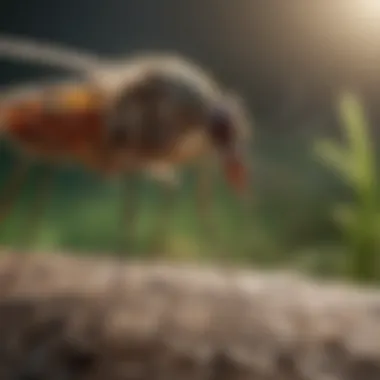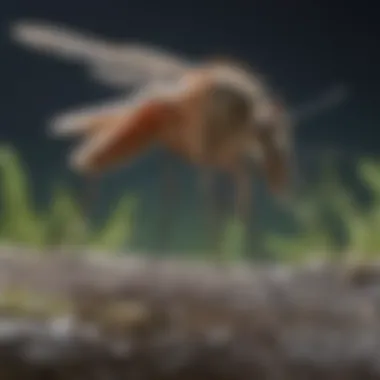Weed Man Mosquito Control: Effective Strategies


Intro
Managing mosquito populations is crucial for homeowners looking to enjoy their outdoor spaces. Mosquitoes not only cause discomfort but can also pose health risks. Understanding the complexities of pest management is essential to navigate this challenge effectively. In recent years, Weed Man has emerged as a notable player in mosquito control, offering targeted strategies and environmentally conscious solutions. This article aims to provide a thorough overview of Weed Man's mosquito control methods, highlighting effective approaches for mitigation and pest management.
Understanding Pests
Definition of Pests
Pests are organisms that negatively impact human activities. In the case of mosquitoes, they disrupt pleasant outdoor experiences and can transmit diseases. Species like Aedes aegypti and Culex pipiens are prevalent in many areas, making them significant pests to manage. Awareness of these species is essential for effective control and prevention.
Importance of Pest Identification
Correctly identifying the type of mosquito is foundational for developing effective control strategies. Each species exhibits specific behaviors, breeding habits, and responses to treatments. Detailed knowledge aids homeowners in selecting proper solutions that align with their local environment and conditions.
Understanding local mosquito species allows homeowners to apply the most applicable treatment methods.
Prevention Techniques
Home and Garden Preventative Measures
Preventing mosquitoes requires vigilance in maintaining tidy yards and gardens. Here are some general strategies:
- Eliminate Standing Water: Regularly check for water accumulation in flower pots, bird baths, and other containers.
- Use Mosquito-Repellent Plants: Certain plants repel mosquitoes due to their natural scent. Consider adding citronella or marigold.
- Secure Garbage Bins: Ensure that trash containers are sealed. They can attract mosquitoes and other pests.
Seasonal Prevention Tips
Mosquito populations fluctuate with the seasons. Awareness of seasonal changes plays a role in its management.
- Spring: Begin inspection and maintenance as temperatures rise, focusing on potential breeding sites.
- Summer: Engage in regular treatments and consider additional measures such as traps or sprays.
- Fall: Finalize preventive strategies before temperatures drop. Remind yourself of resources for continued management next year.
Eco-Friendly Pest Control Solutions
Overview of Sustainable Practices
Weed Man is committed to sustainable pest control strategies that minimize chemical impact on the environment. Here are some practices that reflect this commitment:
- Integrated Pest Management (IPM): This involves evaluating pest populations and applying the smallest effective treatments necessary.
- Biological Controls: Utilizing natural predators such as dragonflies or bats can help control mosquito populations.
Natural Remedies and Their Effectiveness
Natural remedies can offer varying degrees of success in mosquito control. Here are a few options:
- Essential Oils: Oils like peppermint and eucalyptus are known for their repellent properties.
- Garlic Spray: Some studies suggest garlic can deter mosquitoes when sprayed around areas of concern.
Preamble to Weed Man Mosquito Control
Mosquito control has become an essential component of maintaining a healthy environment in residential areas. With the increasing impact of mosquito-borne diseases, understanding effective strategies is crucial. The techniques employed by companies like Weed Man offer home and property owners valuable tools in combating these pests. This section will dive into the specifics of Weed Man's approach, showcasing the benefits and considerations involved in effective mosquito control.
Overview of Weed Man
Weed Man is recognized for its commitment to creating green, healthy spaces through various pest control solutions. Founded on principles of sustainable practices, the company combines effective methodologies with environmentally responsible products. Their mosquito control service is no exception. Through a careful blend of treatment techniques, Weed Man provides tailored solutions to address the unique pest challenges faced by homeowners. This holistic view of pest management helps not only in mosquito prevention but also contributes positively to the overall ecosystem.
Importance of Mosquito Control


The primary reason for implementing mosquito control measures lies in the health risks associated with these insects. Mosquitoes are vectors for several harmful diseases, including West Nile Virus and Zika Virus. By controlling mosquito populations, homeowners can reduce the risk of these diseases affecting their families and pets.
Moreover, creating outdoor spaces that are inviting and safe is vital for family activities. A well-executed mosquito control plan enhances the enjoyment of gardens, yards, and patios. When mosquitoes are managed effectively, families can engage in outdoor recreation without the annoyance of relentless bites.
Effective mosquito management not only protects health but also improves comfort and quality of life for homeowners.
In addition, mosquitoes can disrupt the balance of the local ecosystem if left uncontrolled. Effective treatments help maintain this balance while ensuring that outdoor areas remain pleasant and functional. The engagement with Weed Man’s services represents a proactive stance by homeowners, taking steps to safeguard their living environments from invasive pests.
Understanding Mosquito Behavior
Understanding mosquito behavior is crucial for effective pest control. This knowledge helps homeowners and service providers, like Weed Man, design targeted strategies that address specific mosquito challenges. By comprehending how mosquitoes live, thrive, and interact with their environment, effective solutions can be implemented. Monitoring behavior contributes to reducing mosquito populations, thus enhancing the outdoor experience.
Life Cycle of Mosquitoes
Mosquitoes have a complex life cycle consisting of four distinct stages: egg, larva, pupa, and adult. Each phase presents unique characteristics and vulnerabilities.
Eggs are typically laid in or near water, ensuring that they have moisture necessary for hatching.
Larvae, commonly known as wigglers, are aquatic and feed on organic matter in the water. They require stagnant or slow-moving water bodies for growth.
Pupae are transitional and do not feed; they remain in the water until they mature into adults.
Finally, the adult stage involves breeding and laying more eggs, thereby perpetuating the cycle. Each phase's duration can vary based on environmental conditions like temperature and humidity, impacting how quickly populations can increase.
Understanding this lifecycle allows the implementation of treatments at the most effective times.
Habitat Preferences
Mosquitoes are highly selective about their habitats. They prefer areas that provide close access to water sources for breeding, shelter, and food. Stagnant water such as ponds, bird baths, or clogged gutters creates ideal breeding grounds.
Additionally, mosquitoes seek shaded areas with vegetation for resting and protection from predators. They often inhabit areas with abundant vegetation that provides cover. Homeowners should evaluate their properties to identify and remove potential breeding sites. This proactive approach greatly helps in controlling mosquito populations.
Understanding these habitat preferences can assist in developing effective prevention strategies.
Feeding Habits
Mosquitoes are primarily attracted to carbon dioxide, body heat, and certain body odors that humans and animals emit. Adult female mosquitoes require blood for their reproductive cycles, making them particularly dangerous because they can transmit various diseases.
They feed during specific times of day, mainly at dawn and dusk, when their activity is highest. Understanding these feeding habits aids in planning effective prevention measures, including the application of repellents or protective clothing. Some natural repellents can disrupt these feeding behaviors by masking scents that attract mosquitoes.
In addition, awareness of specific mosquito species can help tailor control methods. By understanding the selective nature of their feeding habits, strategies can be optimized for better results.
Weed Man's Mosquito Control Techniques
Weed Man's approach to mosquito control integrates multiple techniques tailored to combat the specific challenges posed by mosquito populations. Understanding the strategies employed can empower homeowners to make informed decisions about pest management that align with their preferences and property needs. The significance of these techniques lies not only in effective pest elimination but also in promoting a balanced ecosystem.
Barrier Treatments
Barrier treatments are vital in establishing a protective shield around properties. This method involves applying chemicals on vegetation surrounding the area. The primary objective is to create a perimeter that deters mosquitoes from entering. When contemplating barrier treatments, it is essential to consider both the timing and the products used. Optimal application usually occurs in late afternoon or early evening when mosquitoes are most active, thus increasing the treatment's effectiveness.
Benefits of Barrier Treatments:
- Immediate Protection: Creates a quick response to current mosquito infestations.
- Reduced Populations: Helps lower the number of mosquitoes breeding in and around the property.
- Long-lasting effects: Depending on the product used, effects may last several weeks, providing sustained protection.
However, it is crucial to use eco-friendly chemicals whenever possible to protect beneficial insects and local wildlife. Regular reapplication is also necessary to maintain efficacy, especially after rainfalls, which can wash away treatments.
Larvicidal Applications
Larvicidal applications represent another important component in controlling mosquito populations, particularly during the early life stages. While adult mosquitoes are easily recognized, it is vital to target the larvae before they mature.
Applying larvicides to water sources is effective, as many mosquito species breed in stagnant water. Properly managing areas like ponds, bird baths, or even clogged gutters can drastically reduce future adult populations.
Important aspects of Larvicidal Applications:
- Targeted application: This focuses specifically on water sources to interrupt the mosquito life cycle.
- Eco-friendly options: Products derived from natural sources are available and can lessen environmental impact.
It is also worth noting that consistent monitoring of potential breeding sites should become a routine task for homeowners. This proactive stance aids in sustaining the outcomes achieved through larvicidal efforts.
Adult Mosquito Control
Controlling adult mosquitoes is an essential strategy in any comprehensive mosquito management plan. Adult mosquitoes are the carriers of diseases and can multiply rapidly. The objective of adult mosquito control is to reduce their population as effectively as possible.


There are various methods for adult mosquito control, including aerial spraying and ground treatments. Fogging, for instance, disperses insecticides into the air to target mosquitoes directly.
Considerations for Adult Mosquito Control:
- Choosing the right time: Treatments should be done at dusk or dawn when mosquitoes are most active.
- Community Engagement: Coordinating with neighboring properties enhances overall effectiveness, as mosquitoes can easily travel across property lines.
- Safety precautions: Homeowners should ensure that pets and people are indoors during treatments to avoid exposure.
The integration of these techniques provides a well-rounded approach to mosquito management. By combining barrier treatments, larvicidal applications, and adult control measures, homeowners can contribute to reducing mosquito populations effectively, enhancing their outdoor living experience.
Eco-Friendly Mosquito Control Options
Eco-friendly mosquito control is a crucial aspect in today’s approach to pest management. The increasing concern about the impact of chemical treatments on both the environment and human health has made sustainable solutions more relevant than ever. Homeowners are seeking methods that not only effectively address mosquito problems but also prioritize ecological balance. Adopting eco-friendly practices helps reduce chemical usage, minimizes harm to beneficial insects, and contributes to a healthier habitat.
The use of environmentally safe options can lead to a reduction in mosquito populations while promoting safety for pets, children, and local wildlife. Awareness of the surrounding ecosystem and the long-term effects of pest control measures are significant considerations. Here, we will explore the two primary eco-friendly mosquito control methods: biological control methods and natural repellents.
Biological Control Methods
Biological control methods involve using natural predators or pathogens to manage mosquito populations. This can include introducing organisms that feed on mosquito larvae or disrupt their survival in another way. Common natural predators in various environments include:
- Fish: Species like goldfish and mosquito fish consume mosquito larvae in water bodies.
- Amphibians: Frogs and tadpoles can also be effective in controlling larvae in ponds or standing water.
- Insects: Certain insects, such as dragonflies, prey on adult mosquitoes and their young.
The advantages of biological control are numerous. These methods are generally environmentally friendly and promote biodiversity. However, it’s important for homeowners to understand the local ecosystem before introducing new species to prevent unintended consequences. Ensuring that the predators introduced are suited to the environment helps maintain a balance in the ecosystem.
"Using nature’s own processes to manage pests results in less reliance on chemical controls and fosters a healthier environment."
Natural Repellents
Natural repellents are another effective option for mosquito control. These products are often derived from plants and contain essential oils that deter mosquitoes without harmful chemicals. Some popular natural repellents include:
- Citronella: Widely known for its effectiveness, citronella oil is often found in candles and sprays.
- Lavender: Known for its pleasant scent and mosquito-repelling properties, lavender can be grown around homes.
- Eucalyptus: Oil from eucalyptus leaves provides a strong barrier against mosquito bites.
Using natural repellents can be an accessible option for homeowners. They are often safer for indoor use, especially where children or pets are present. However, their effectiveness can vary and frequent reapplication might be necessary.
Natural repellents also contribute to a holistic approach to mosquito control; they scare away pests while having minimal impact on beneficial insects. By integrating these methods into an overall pest management strategy, homeowners can protect their properties while maintaining an eco-friendly focus.
Preparing for Mosquito Control Treatments
Effective mosquito control begins long before any treatments are applied. Preparing for mosquito control is essential as it sets the foundation for successful management of these pests. By conducting a thorough assessment and developing a well-structured plan, you can significantly enhance the impact of the control measures taken. In this section, we explore the critical steps involved in preparation and their respective benefits.
Assessment of Property
The first step in preparation is conducting a comprehensive assessment of your property. It is important to identify areas where mosquitoes are likely to breed and gather. This includes standing water sources, such as bird baths, clogged gutters, and containers that accumulate rainwater. By locating these breeding grounds, you can target areas for potential treatments effectively.
In addition to identifying breeding sites, consider the vegetation around your property. Dense shrubs and tall grass can serve as resting areas for adult mosquitoes during the day. Understanding the layout and features of your property will help you in assessing the extent of mosquito presence and the best strategies for control.
Some key elements to consider during the assessment include:
- Water sources: Check for stagnant water areas. Any standing water should be removed or treated to prevent breeding.
- Landscaping features: Identify plants and structures that could provide shelter for mosquitoes.
- Nearby environments: Understand if there are natural resources nearby, such as ponds or marshes, that could influence mosquito populations.
Creating a Mosquito Control Plan
Once the assessment is complete, the next step is to create a mosquito control plan tailored to the findings. A good plan takes into account the specific conditions of your property and the behavior of local mosquito species. This tailored approach increases the effectiveness of the countermeasures used.
Start by prioritizing the areas that need immediate attention based on the assessment. Clearly outline the treatment methods that will be employed, including the timing and frequency of applications. A well-crafted plan will also consider potential environmental impacts and will strive for an eco-friendly approach wherever possible.


Some key considerations for your mosquito control plan are:
- Treatment methods: Determine which methods, such as barrier treatments or larvicidal applications, are most suitable based on your assessment.
- Schedule: Create a timeline for treatments to synchronize with peak mosquito activity periods.
- Monitoring: Integrate a monitoring strategy to evaluate the effectiveness of the treatments and adapt the plan as necessary.
"A well-structured mosquito control plan is vital for minimizing pest populations and safeguarding your outdoor spaces."
Ongoing Mosquito Management
Ongoing mosquito management is crucial for homeowners who aim to maintain effective defense against these pests. Regular monitoring and adjusting treatments are necessary to keep mosquito populations in check. It is not enough to implement a control strategy once and expect lasting results. Instead, it requires a commitment to a long-term management plan.
The benefits of ongoing management are clear. Regular assessments can help identify potential breeding sites, seasonal patterns, and shifts in mosquito behavior. Maintaining a proactive stance ensures that control measures remain effective. This approach also minimizes the risk of sudden mosquito infestations, which can disrupt outdoor activities and hinder enjoyment of one's property.
Considerations about ongoing management include the local ecosystem. Understanding the balance between effectiveness and environmental impact is essential. Homeowners should also stay informed about local mosquito species, as different species may require different approaches to control.
Monitoring Mosquito Populations
Monitoring mosquito populations is the first step in ongoing management. Regular inspections allow homeowners to assess the situation effectively. This could involve checking common breeding sites such as stagnant water, clogged gutters, and flower pots. Identifying these areas early can prevent major infestations. Using traps can also help gauge populations.
Homeowners can work closely with pest control experts from Weed Man to determine the best monitoring methods. Keeping records of mosquito activity can aid in adjusting control strategies over time.
Adjusting Treatments
Adjustment of treatments is essential to keep pace with changing mosquito populations. Weather patterns, rainfall, and seasonal changes directly impact mosquito activity. For instance, a wet spring may lead to an increase in populations.
Homeowners should communicate with professionals to adapt treatment products and methodologies. This could include applying more frequent larvicidal treatments or switching from barrier sprays to other methods if necessary. Continual evaluation means that the treatments applied are tailored to current conditions.
Educating Homeowners
Educating homeowners is an integral part of ongoing mosquito management. Awareness can significantly enhance the effectiveness of treatments. Providing information about mosquito life cycles, common habitats, and preventative measures empowers homeowners to take proactive steps.
Homeowners should be encouraged to attend workshops or sessions organized by pest management companies like Weed Man. This knowledge can significantly contribute to their strategies in managing mosquito populations. Effective communication fosters a community approach to pest control, which is often more effective than isolated efforts.
"A well-informed homeowner is the best ally in the fight against mosquito infestations."
The End: The Value of Integrated Pest Management
Integrated Pest Management (IPM) is a cornerstone of effective mosquito control strategies employed by Weed Man. This approach focuses on understanding and managing pest populations holistically, rather than relying solely on chemical treatments. By incorporating multiple strategies, IPM minimizes health risks, environmental impact, and pest resistance.
One of the primary benefits of IPM is its emphasis on prevention. This involves assessing the property and ecosystem to identify potential mosquito breeding sites. By eliminating stagnant water and maintaining landscape features, homeowners can significantly reduce mosquito habitats. This proactive approach discourages infestations before they escalate.
Additionally, Weed Man’s methods align with eco-friendly practices. The use of biological controls, such as introducing natural predators, reinforces the balance of local ecosystems. This not only aids in controlling mosquito populations but also supports broader environmental goals. Homeowners who prioritize sustainable practices find IPM to be a comprehensive solution to managing pests.
"With Integrated Pest Management, less reliance on chemicals translates to safer environments for families and pets."
The IPM framework also allows for adaptability. Mosquito populations can vary with seasons and local conditions. Weed Man's techniques include continuously monitoring these factors and adjusting treatments accordingly. This flexibility ensures communities are equipped to handle changing pest dynamics effectively.
In summary, the value of Integrated Pest Management within Weed Man's mosquito control strategies is substantial. It equips homeowners with effective solutions, prioritizes environmental health, and fosters awareness about pest behaviors. This knowledge empowers individuals to make informed decisions regarding pest management in their gardens and homes.
Summarizing Key Points
- Integrated Pest Management employs a multifaceted approach to mosquito control.
- Prevention is emphasized through property assessments and habitat management.
- Eco-friendly practices are integrated into treatments, aligning with sustainability goals.
- The adaptive nature of IPM allows for adjustments based on changing conditions.
- Homeowners benefit from increased safety and effectiveness of pest management strategies.
Future Considerations in Mosquito Control
As awareness of environmental issues grows, the future of mosquito control must address evolving challenges. Continuous research into biological control methods and natural repellents will play a significant role in developing new solutions.
Furthermore, technological advancements can enhance monitoring mechanisms. Innovations such as remote sensing and data analysis may allow for better tracking of mosquito populations and breeding patterns. This provides a foundation for more precise pest management strategies.
Finally, community involvement remains crucial. Educating homeowners about IPM principles fosters collective action against mosquito populations. Engagement programs and workshops can enhance public knowledge, ultimately leading to healthier living environments.
By focusing on these future considerations, Weed Man can ensure that its mosquito control strategies not only address immediate needs but also contribute to long-term sustainability and effectiveness.

